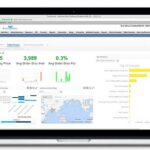The Best Fluffy Pancakes recipe you will fall in love with. Full of tips and tricks to help you make the best pancakes.
Artificial Intelligence (AI) has revolutionized how businesses operate, and its use for business intelligence is growing at a rapid pace. AI-powered business intelligence provides real-time insights into complex business operations, enabling companies to make data-driven decisions and stay ahead of the competition. In this article, we’ll delve into the benefits of AI for business intelligence, how it works, and the potential challenges businesses may face when implementing AI.
Introduction
Artificial Intelligence is transforming how businesses operate and compete in the marketplace. Business Intelligence, on the other hand, involves analyzing data to make informed decisions. The combination of AI and BI enables businesses to process vast amounts of data, uncover insights, and make data-driven decisions in real-time. In this article, we’ll explore the benefits of AI for business intelligence, the types of AI used in BI, and the challenges businesses face when implementing AI.

What is Business Intelligence?
Business Intelligence involves analyzing data to help companies make informed decisions. BI includes the use of data warehousing, data mining, and data visualization to transform data into insights. The goal of BI is to enable businesses to make informed decisions based on data, rather than gut instincts. BI provides organizations with the ability to analyze historical data and predict future trends, which is essential for staying ahead of the competition.
How AI is transforming Business Intelligence
AI-powered business intelligence is transforming how businesses operate by providing real-time insights into complex business operations. AI algorithms enable organizations to analyze vast amounts of data and derive insights that humans may have missed. The use of AI in BI has enabled companies to analyze data more quickly and accurately, enabling faster and better decision-making.
Benefits of AI for Business Intelligence
Real-time data analysis
AI enables organizations to analyze vast amounts of data in real-time, providing up-to-the-minute insights into business operations. This is essential for companies operating in fast-paced industries where decisions need to be made quickly.
Enhanced decision-making
AI-powered business intelligence enables companies to make data-driven decisions, reducing the reliance on gut instincts. By analyzing vast amounts of data, companies can make better-informed decisions that are more likely to succeed.
Improved efficiency and productivity
The use of AI in BI has improved the efficiency and productivity of business operations. By automating mundane tasks, such as data entry and analysis, employees can focus on more complex tasks, leading to increased productivity.
Predictive analytics
AI-powered BI enables companies to predict future trends, enabling them to plan and prepare for the future better. Predictive analytics can help companies identify new market opportunities, reduce risk, and improve performance.
Competitive advantage
By using AI-powered business intelligence, companies can gain a competitive advantage in the marketplace. Real-time insights and predictive analytics enable companies to stay ahead of the competition and make strategic decisions that drive growth and profitability.
Types of AI used in Business Intelligence
There are several types of AI used in business intelligence. These include:
Machine learning
Machine learning algorithms enable computers to learn from data and improve their accuracy over time. Machine learning is used in BI to analyze data and identify patterns and trends that humans may have missed.
Natural language processing
Natural language processing (NLP) enables computers to understand human language and communicate with humans. NLP is used in BI to extract insights from unstructured data sources, such as social media and customer reviews.
Deep learning
Deep learning algorithms are used in BI to analyze complex and unstructured data sources, such as images and videos. Deep learning enables computers to recognize patterns and make predictions based on this data.
Challenges of Implementing AI in Business Intelligence
Implementing AI in BI can be challenging, and there are several potential obstacles that businesses may face. These include:
Data quality
AI algorithms rely on high-quality data to provide accurate insights. If the data is inaccurate or incomplete, the results of the analysis may be unreliable.
Data privacy and security
The use of AI in BI raises concerns about data privacy and security. Companies need to ensure that they are complying with data protection regulations and that their data is secure.
Lack of AI talent
There is a shortage of AI talent, and it can be challenging to find skilled professionals who can develop and implement AI solutions.
Best Practices for Implementing AI in Business Intelligence
To overcome these challenges, businesses need to follow best practices for implementing AI in BI. These include:
Define clear objectives and goals
Companies need to define clear objectives and goals for their AI-powered BI projects. This ensures that the project aligns with the business’s strategic objectives and that the results are measurable.
Select the right tools and technologies
Companies need to select the right tools and technologies for their AI-powered BI projects. This includes selecting the appropriate machine learning algorithms, NLP tools, and data visualization tools.
Invest in data management and quality
To ensure the accuracy of the insights generated by AI algorithms, companies need to invest in data management and quality. This includes ensuring that the data is accurate, complete, and up-to-date.
Prioritize data privacy and security
To address concerns about data privacy and security, companies need to prioritize these issues when developing and implementing AI-powered BI solutions. This includes complying with data protection regulations and using secure data storage and transmission methods.
Educate employees and stakeholders
To ensure the success of AI-powered BI projects, companies need to educate employees and stakeholders about the benefits and limitations of AI. This helps to ensure that everyone is on board with the project and understands how it will impact their roles.
Real-world Examples of AI for Business Intelligence
Several companies have successfully implemented AI-powered BI solutions. These include:
Sales forecasting at IBM
IBM used machine learning to develop a sales forecasting system that enabled the company to predict sales more accurately. The system analyzed historical sales data and used this information to predict future sales trends.
Fraud detection at PayPal
PayPal uses machine learning to detect fraudulent transactions. The system analyzes transaction data and identifies patterns that are indicative of fraud.
Customer segmentation at Sephora
Sephora uses NLP to analyze customer reviews and social media posts to identify trends and insights. This information is used to develop targeted marketing campaigns and improve customer segmentation.
Conclusion
AI-powered business intelligence is transforming how companies operate, enabling them to make data-driven decisions and stay ahead of the competition. While implementing AI in BI can be challenging, following best practices and learning from real-world examples can help companies overcome these challenges and
achieve success. By defining clear objectives, selecting the right tools and technologies, investing in data management and quality, prioritizing data privacy and security, and educating employees and stakeholders, companies can successfully implement AI-powered BI solutions.
As more businesses adopt AI-powered BI solutions, it is clear that AI will play an increasingly important role in shaping the future of business intelligence. By leveraging the power of AI, companies can gain a competitive advantage, make more informed decisions, and drive growth and profitability.
FAQs
- What is AI for business intelligence? AI for business intelligence refers to the use of artificial intelligence (AI) technologies, such as machine learning and natural language processing, to analyze and extract insights from business data.
- What are the benefits of using AI for business intelligence? The benefits of using AI for business intelligence include real-time insights, predictive analytics, improved decision-making, and a competitive advantage in the marketplace.
- What are some of the challenges of implementing AI in business intelligence? Some of the challenges of implementing AI in business intelligence include data quality, data privacy and security, and a lack of AI talent.
- What are some best practices for implementing AI in business intelligence? Some best practices for implementing AI in business intelligence include defining clear objectives and goals, selecting the right tools and technologies, investing in data management and quality, prioritizing data privacy and security, and educating employees and stakeholders.
- What are some real-world examples of AI for business intelligence? Real-world examples of AI for business intelligence include sales forecasting at IBM, fraud detection at PayPal, and customer segmentation at Sephora.



